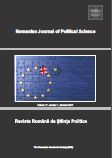How to Engage “Democratic Natives”? Political Sophistication as Important Determinant of Civic Activity of Young Citizens in New Democracies (the Case of Poland)
How to Engage “Democratic Natives”? Political Sophistication as Important Determinant of Civic Activity of Young Citizens in New Democracies (the Case of Poland)
Author(s): Radosław MarzęckiSubject(s): Politics, Civil Society
Published by: Societatea Academică Română (SAR)
Keywords: political sophistication; personal efficacy; party identification; interest in politics; civic activity; youth; students;
Summary/Abstract: The article describes the roles of democratic institutions (using the example of political parties) in new European democracies (with emphasis on Poland) during the formation and consolidation of civic political culture. The main assumption of the article is that youth is the key phase of life for political socialization, especially in terms of patterns of political participation. The problem is considered from two perspectives. The first theoretical perspective assumes that democratic institutions can fulfill crucial educational and socialization functions for the first generation of citizens to have been brought up in democratic states and who are referred to by the author as democratic natives. The second empirical perspective searches for answers to the following questions: “How and where can democratic institutions (not only parties) stimulate the civic activity of young, politically inexperienced citizens?” and “How can they practically invest in youth participation and good citizenship?” The analysis of data collected during a survey of Polish students makes it possible to identify three areas in which institutions can fulfill their social functions: personal efficacy, identification with political parties and the interest of young people in politics. The author develops a logistic regression model and concludes that stimulation of these three indicators (political sophistication) can help create positive social phenomena (civic activity) for citizens, who – unlike their parents’ generation – have grown up in a democratic state. It becomes clear that an interest in politics is less important than the other two constructs, and therefore the civic activity of young people (who are usually less interested in politics) can be more effectively determined by social leaders or politicians in their constituencies. The findings can contribute to the discussion on how to encourage young citizens to participate in politics for the public good.
Journal: Romanian Journal of Political Sciences
- Issue Year: 17/2017
- Issue No: 1
- Page Range: 135-169
- Page Count: 35
- Language: English
- Content File-PDF

